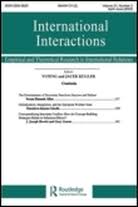
In August 2013, the journal International Interactions published “Radicalism of the Hopeless: Refugee Flows and Transnational Terrorism”, an article co-authored by Daniel Milton, Megan Spencer, and Michael Findley.
Click here to learn more about the article, or read the abstract below.
We examine whether refugee flows increase transnational terrorism in states to which refugees flee. Recent studies find that refugee flows contribute to the spread of interstate and civil war, but to a far lesser extent have studies examined how refugee flows could lead to other forms of political violence. We discuss two ways in which refugee flows can lead to transnational terrorism: how conditions in camps contribute to the radicalization of refugees; and how poorly host states treat refugees. We then conduct empirical tests using data on worldwide international refugee flows and transnational terrorism. Specifically, we model the effect of refugee flows on transnational terror attacks within a directed dyad framework to account for characteristics of origin and host states. Using a rare-events logit model, along with count models to check robustness, we find that refugee flows significantly increase the likelihood and counts of transnational terrorist attacks that occur in the host country, even when controlling for other variables. Given the prominence of refugee flows and populations worldwide, the results suggest that states with significant refugee populations and the international community at large should take measures to address the conditions in refugee camps, as well as the treatment of refugees by host states in order to prevent transnational terrorism.
 Skip to content
Skip to content
